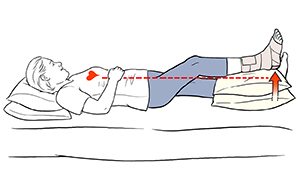Self-Care for Strains and Sprains
Most minor strains and sprains can be treated with self-care. Recovering from a strain or sprain may take 6 to 8 weeks. Your self-care goal is to reduce pain and immobilize the injury to speed healing.
Support the injured area
Wrapping the injured area provides support for short, necessary activities. Be careful not to wrap the area too tightly. This could cut off the blood supply.
-
Support a wrist, elbow, or shoulder with a sling.
-
Wrap an ankle or knee with an elastic bandage.
-
Tape a finger or toe to the one next to it.
Use cold and heat
Cold reduces swelling. Both cold and heat reduce pain. But don't use heat when first treating the injury. When using cold or heat, always place a thin towel between the pack and your skin.
-
Apply ice or a cold pack 10 to 15 minutes every hour you’re awake for the first 2 days. To make an ice pack, put ice cubes in a plastic bag that seals at the top. Wrap the bag in a thin towel or cloth. Don’t put ice or an ice pack directly on the skin.
-
After the swelling goes down, use cold or heat to control pain. Don’t use heat late in the day, since it can cause swelling when you’re not active.
Rest and elevate
Rest and elevation help your injury heal faster.
-
Raise the injured area above your heart level.
-
Keep the injured area from moving.
-
Limit the use of the joint or limb.

Use medicine
-
Aspirin reduces pain and swelling. (Note: Don’t give aspirin to a child 18 or younger unless prescribed by the healthcare provider. Taking aspirin can put a child at risk for Reye syndrome. This is a rare but very serious disorder. It most often affects the brain and the liver.)
-
Nonsteroidal anti-inflammatory drugs, such as ibuprofen, may reduce pain and swelling, as well. Ask your healthcare provider for advice. If you have chronic liver or kidney disease, talk with your provider before using these medicines. Also talk with your provider if you’ve had a stomach ulcer or GI (gastrointestinal) bleeding.
When to call your healthcare provider
Call your healthcare provider or get medical care right away if:
-
The injured joint won’t move, or bones make a grating sound when they move
-
You can’t put weight on the injured area, even after 24 hours
-
The injured body part is cold, blue, tingling, or numb
-
The joint or limb appears bent or crooked.
-
Pain increases or doesn’t improve in 4 days
-
When pressing along the injured area, you notice a spot that is especially painful
Online Medical Reviewer:
Raymond Turley Jr PA-C
Online Medical Reviewer:
Rita Sather RN
Online Medical Reviewer:
Thomas N Joseph MD
Date Last Reviewed:
10/1/2024
© 2000-2024 The StayWell Company, LLC. All rights reserved. This information is not intended as a substitute for professional medical care. Always follow your healthcare professional's instructions.